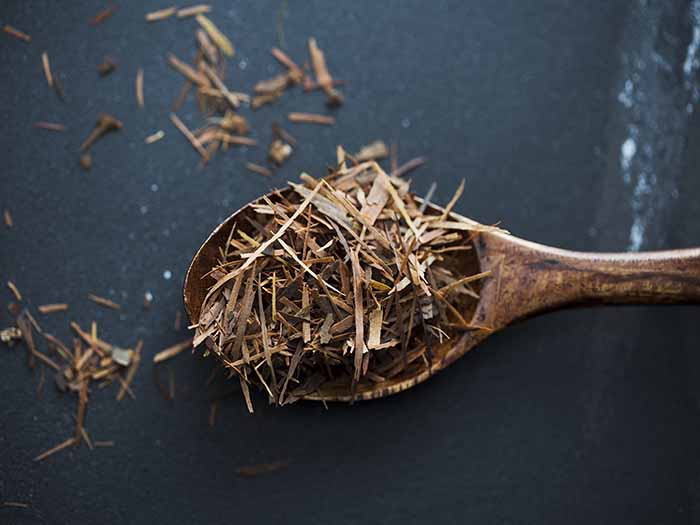Drinking Pau d’Arco or taheebo tea is a wonderful way to boost your immune system and tap into thousands of years of South American wisdom!
What is Pau d’Arco or Taheebo Tea?
Taheebo tea is a traditional tea brewed from the shredded inner bark of a South American tree scientifically known as Tabebuia avellanedae. [1]This potent brew dates back to at least the time of the Incas and other great empires of South America. Also known as lapacho and Pau d’Arco, the bark of this tree possesses the medicinal components, unlike many other types of tea, which use the leaves. The tree grows widely in parts of South America, and that is primarily where it is consumed, but you can get access to taheebo tea in specialty health and exotic import stores.
The taste of this tea is extremely mild and earthy, thanks to the tannin content, but it is not bitter enough to require a natural sweetener. Even so, many people do add honey or other mild sweeteners to improve the overall flavor.
Taheebo Tea Benefits

Loose-leaf taheebo tea Photo Credit: Shutterstock
Taheebo tea benefits come from its antibacterial, anti-inflammatory, anti-fungal, & antiviral properties. They include its impact on the immune system, circulation, and digestive processes, among others.
Immune System
Functioning as a natural antibiotic, and featuring many antioxidants, this tea is able to boost the strength of your immune system and stimulate the production of white blood cells. [2]
Digestion
This tea has natural laxative effects that will help to relieve symptoms of constipation and diarrhea, while also improving nutrient uptake and preventing parasitic or bacterial infections in the gut. [3]
Anticancer Properties
The antioxidants found in this tea are known to induce apoptosis in cancer cells, which can prevent the spread of these cellular mutations (B. Mukherjee et al., 2009). [4]
Autoimmune Disease
Research on this tea’s effects has been very promising, showing that it can improve autoimmune disease symptoms, such as those associated with AIDS and lupus. [5]
Circulation
This tea is known to stimulate the production of red blood cells, which can boost circulation, while also cleansing the liver and lowering the overall toxicity levels of your body. [6]
How to Make Taheebo Tea?
If you can get your hands on taheebo tea or the dried bark of this tree, brewing your own taheebo tea at home is quite simple. Let’s take a look at the recipe below.

Taheebo Tea Recipe
Ingredients
- 2 tsp taheebo dried leaves
- 4 cups of water
- 1 tsp of lemon juice (optional)
- 1 tsp of honey (optional)
Instructions
- To make taheebo tea, bring 2 teaspoons of taheebo tea in 4 cups of water to a boil in a saucepan
- Allow the mixture to boil for roughly 5 minutes.
- Then gradually reduce the heat and simmer the contents for another 20-25 minutes.
- Strain the tea to remove any excess fibers from the root.
- Add honey and lemon juice to improve the flavor and serve hot.
Taheebo Tea Side Effects
While there are many benefits, this South American tea also has potential negative side effects, including allergic reactions and complications with pregnancy. Common allergic reactions will include gastrointestinal distress, nausea or vomiting, and you should discontinue use. Also, people with bleeding disorders should use this tea with caution, as it has blood-thinning properties. Pregnant women should not use this tea unless they have permission from their doctor.
